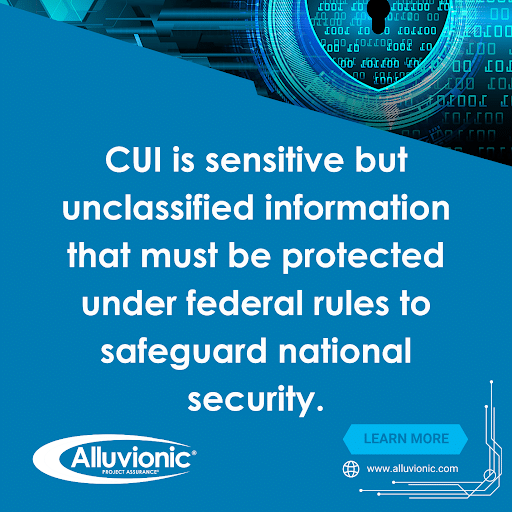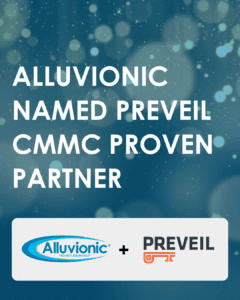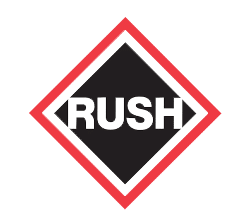
CMMC DFARS Rule Now in Effect: Do You Need to Certify?
What to Know About the November 10 Rule You may have heard that November 10, 2025 was a big day for cybersecurity compliance in the
CMMC is here! Register for our free webinar with guests from C3PAOs – Nov 18 @ 1PM EST. Save Your Spot →
If your organization is working with the Department of Defense (DoD), you must understand Controlled Unclassified Information (CUI) and the role of CMMC (Cybersecurity Maturity Model Certification) in protecting it. Mishandling CUI can result in contract termination, legal penalties, and national security risks.

This guide explains:
By understanding and implementing CUI security best practices, your organization can maintain compliance, safeguard sensitive data, and stay competitive in government contracting.
CUI refers to sensitive but unclassified information that requires safeguarding under federal laws, regulations, and policies. While it does not carry a classified designation, it is still essential to national security and operational integrity.
Definition of CUI
According to 32 CFR § 2002.4(h), CUI is:
“Information the Government creates or possesses, or that an entity creates or possesses for or on behalf of the Government, that a law, regulation, or Government-wide policy requires or permits an agency to handle using safeguarding or dissemination controls.”
In practical terms, CUI is any government-related information that requires protection but does not meet the criteria for classification as Confidential, Secret, or Top Secret.
Examples of CUI
CUI encompasses a wide range of sensitive information, including but not limited to:
If your organization processes, stores, or transmits any of this data, you are legally required to implement cybersecurity measures to protect it.
1. National Security & Cyber Threats
CUI is a prime target for foreign adversaries, hackers, and corporate espionage. The unauthorized disclosure of CUI can:
Recent cyberattacks have demonstrated that defense contractors—particularly small and mid-sized businesses—are frequently targeted because they often have weaker security postures than larger organizations.

The DoD mandates cybersecurity compliance to ensure CUI remains secure. The key regulations include:
Failing to comply with these requirements can result in:
A strong cybersecurity posture is not just a compliance checkbox—it is a competitive advantage. Contractors who can demonstrate compliance with CUI protection standards are more attractive to:
By proactively implementing CMMC security controls, your company positions itself as a trusted, reliable partner in the federal contracting space.
What is Scoping?
Scoping is the process of identifying which assets in your business handle CUI and therefore require NIST SP 800-171 rev2 security controls.
Proper scoping allows organizations to:
Not every device, network, or system in your organization requires full compliance—only those that process, store, or transmit CUI.
CMMC defines five categories of assets to determine which systems require protection.
Example: A secure server storing DoD technical schematics or a contract management system handling sensitive project details.
Example: A firewall that filters malicious traffic or intrusion detection systems that monitor network activity.
Example: A laptop used by an engineer that occasionally accesses CUI-related projects.
Example: A test lab machine that interacts with CUI but relies on legacy software that cannot be fully encrypted.
Example: A marketing computer used only for website management and social media.

Navigating CMMC compliance and CUI security can be complex, but Alluvionic simplifies the process by providing expert guidance and hands-on support.
We help government contractors:
Protect Your DoD Contracts – Get Expert Support Today
Contact Alluvionic to ensure CMMC readiness and cybersecurity compliance.

What to Know About the November 10 Rule You may have heard that November 10, 2025 was a big day for cybersecurity compliance in the

ICYMI: Insights from Our Webinar — CMMC Contract Clause DFARS 252.204-7021 Explained The CMMC landscape shifted in a major way with the release of DFARS

Alluvionic Named PreVeil CMMC Proven Partner Alluvionic has been selected as a PreVeil CMMC Proven Partner, a designation awarded to partners who either received a







It’s simple. A project that gets off on the right foot is likely to take a successful journey. So why do so many projects fail? Use this checklist to assure your project succeeds from the beginning.

Whether you need project management, process improvement, cybersecurity, product development, training, or government services, Alluvionic has the expertise to provide Peace of Mind and Project Assurance®.